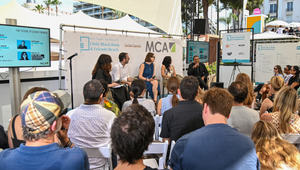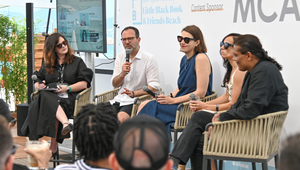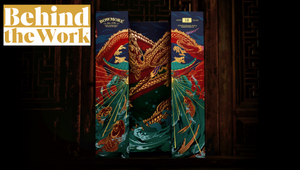
How a McDonald’s Spot Thrived While Lost in Translation

Earlier this year, a McDonald's jingle, "Nihon No Fureeba," became Indonesia's top pop song on Shazam, garnering millions of YouTube views. While this may have seemed surprising to outsiders, to the creative team at Leo Burnett Indonesia, it was all part of the plan.
Behind the McDonald’s campaign ‘The Untranslated Ad’ are the creators Dafi Alfadila, senior creative director; Joshua Tjandra, associate creative director; and Sakshi Sharma, senior planning manager at Leo Burnett Indonesia.
Speaking to LBB’s Tom Loudon, the team shares the initial inspiration and thought process behind this unique campaign, highlighting the extant intrigue of Japanese pop culture in Indonesia. They chalk up the campaign’s success to an innovative approach and strategic use of music that combines elements of J-Pop fandom and a McDonald's twist to captivate their audience.
LBB> The McDonald's jingle "Nihon No Fureeba" became Indonesia's top pop song on Shazam, with millions of views on YouTube. Can you share the initial inspiration and thought process behind creating this unique campaign?
Dafi> Japanese pop culture has always been a part of many Indonesian lives. When McDonald’s wanted to launch its new ‘Taste of Japan’ range, we began thinking about using this obsession with Japanese culture to attract newer Japanese enthusiasts beyond old loyalists. Indonesian people's blind love for Japanese things became our main arsenal to sell a peculiar yet very Japanese burger with its sesame-sprinkled white bun.
Sakshi> We discovered an interesting ‘fan truth’ about the ‘Taste of Japan’ menu: people were intrigued by the confusing combination of Bapao Bun Yakiniku sauce in burger format with nori instead of salad. But to leverage this impactfully, we had to seamlessly insert ourselves in the world of Japanese culture enthusiasts with a McDonald’s ‘feel good’ twist.
Joshua> Take a look at how many Japanese artists are popular in Indonesia. From Utada Hikaru to the newest sensation, Yoasobi, many go crazy for J-Pop. People sing, dance, and put the songs in their playlists, even without understanding the lyrics.
LBB> One of the remarkable aspects of this campaign is that people initially thought it was just a J-pop song without realising it was an ad. How did you manage to keep this a secret, and what were the challenges in doing so?
Joshua> Funnily enough, some people – especially Ica’s fans, who knew what the lyrics meant – decided to play along with us. They would tease their friends on social by giving out subtle hints yet refrained from fully revealing them. Today’s internet loves to gatekeep, after all, no? We also put a limited promo code inside the lyrics, so people would also get the value of keeping the surprise to themselves.
LBB> The campaign leveraged the popularity of Japanese pop culture in Indonesia. Could you elaborate on how you identified this cultural connection and used it in your marketing strategy?
Sakshi> The love for everything Japanese has only grown in Indonesia in the past few years – there has been a new surge of Gen Z cosplayers, anime lovers and J-pop enthusiasts. We wanted to capture the attention and love of everyone who fell on this spectrum of wanting to try innovative Japanese food – from the Weeaboo community and anime lovers to the culture dabblers. And to engage this varied audience with a varied degree of cultural connection to Japan, we needed a universal language to get there – and what would be better than music?
LBB> Collaborating with Indonesian-Japanese singer Ica Zahra was a key part of the campaign. What led to this collaboration, and how did Ica Zahra react when she found out the song promoted McDonald's?
Dafi> First and foremost, the agency and the McDonald’s team agreed that the singer or musician should be able to pull a top-notch, catchy, singalong tune. Then, Ica Zahra's name came up from our social media team. Knowing her reputation and experience within Japan’s music industry, we knew she was the answer for the project.
Joshua> Her reaction? She laughed.
LBB> The music video for "Nihon No Fureeba" gained millions of views in just one week. How did you ensure the video resonated with the audience and encouraged engagement?
Dafi> We studied the ways to properly launch a music single because we wanted to launch the teaser content as unbranded content. In this case, it was essential for the artist herself to be present during the promotion and marketing activities for the song. We worked with radio stations, podcasts, and influencers while spreading content from Ica's social handle and building hype through her fans. But in the end, the music she created obviously speaks for itself.
LBB> People's attention shifted to McDonald's Taste of Japan burgers after realising the song was an ad. Can you discuss the messaging strategy behind this shift and its impact on burger sales?
Sakshi> While we wanted to ensure that people could relate to McDonald’s through a cultural experience, it was important we led them to our menu as well.
Once it was revealed as an ad, the message was quite simple – you don’t need to understand our menu/burgers to enjoy them, just like the song. This led to a significant uplift in overall sales of the menu and burgers within two weeks of the campaign’s launch.
LBB> Even after realising it was an ad, people continued to engage with the song. What does this continued engagement tell you about the campaign's effectiveness in building brand affinity?
Dafi> Creating content that is pure entertainment is the core of this campaign. When we revealed that the song they chose to consume is actually an ad, people felt far from being tricked because McDonald’s pokes fun at its audience by speaking the same ‘language’. And although we were tapping into a specific subculture, the brand story spread wider to a bigger audience because it put a smile on their face.
Sakshi> In addition to the song being a total banger, as a brand, McDonald’s was able to connect to the audience on a visceral level – they were in on the ‘joke’, so to say. Dialogues like this with the audience are what make a brand more relatable to them, making them want to put us on repeat!
LBB> "Nihon No Fureeba" is now featured in thousands of Spotify playlists. How has this unexpected longevity impacted McDonald's brand perception in Indonesia?
Sakshi> McDonald’s has seen a rise in being considered a brand ‘that is for me’, ‘great tasting burgers’, with the highest increase on being an ‘Innovative brand’.













